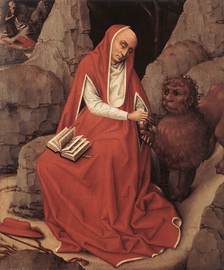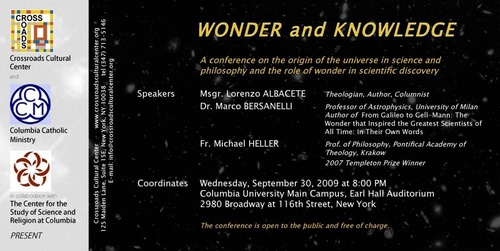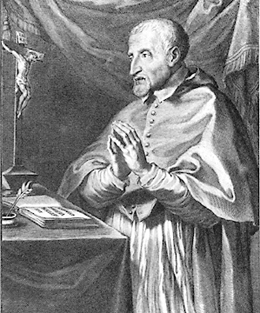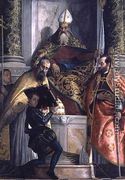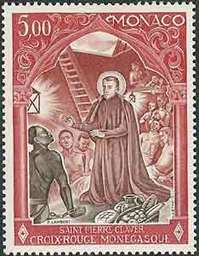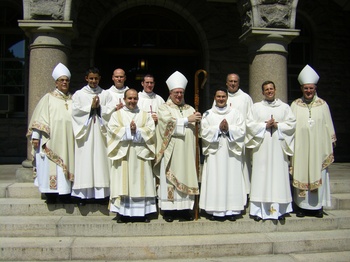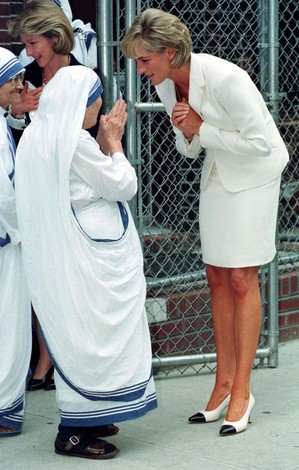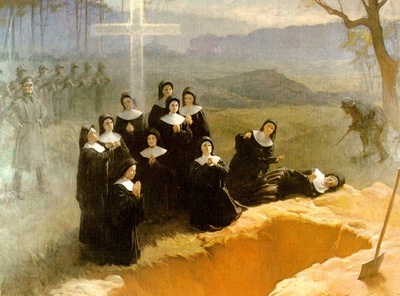September 2009 Archives
On the Thirtieth Anniversary of the Founding of Communion and Liberation
Rome, September 29, 1984
Dearest Brothers and Sisters! I wish first of all to thank Msgr Giussani for his introductory remarks, as well as all the others who took part in this introduction.
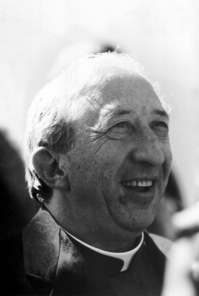
1. I express my great joy for this meeting with you, who have come here to Rome to celebrate thirty years of your movement and to reflect together with the Pope on your history as persons who live in the Church and are called to cooperate in intense communion, to bring it to mankind, and to spread it in the world.
Looking at your faces, so open, so happy on this festive occasion, I experience a deep feeling of joy and the desire to show you my affection for your decision of faith and to help you to be ever more mature in Christ, sharing His redemptive love for man. The photographic exhibition which I was able to admire as I entered the room, words (testimonies, accounts, and songs) that I have just heard have allowed me to retrace, as from within, this period of your life, which is part of the life of the Italian Church (and not only Italian any longer) of our time. These words have given me the possibility of seeing clearly the educational criteria of your way of living in the Church, which imply a vivacious and intense work in the most varied social contexts.
I am grateful to the Lord for all this, who once again has made me admire His mystery in you, which you bear and must always be ready to bear, with humble awareness of being pliable clay in His creative hands.
Continue with commitment on this road so that also through you the Church may still more be the environment of the redemptive existence of man, a fascinating environment where every man finds the answer to the question of the meaning of his life: Christ, center of the cosmos and of history.
2. Jesus, the Christ, He in whom everything is made and subsists, is therefore the interpretative principle of man and his history. To affirm humbly but equally tenaciously that Christ is the beginning and inspirational motive for living and working of consciousness and of action, means to adhere to Him, to make present adequately His victory over the world.
To work so that the content of the faith becomes understanding and pedagogy of life is the daily task of the believer, which must be carried out in every situation and environment in which they are called to live. And the richness of your participation in ecclesial life lies in this: a method of education in the faith so that it may influence the life of man and history; in the sacraments, so that they bring about an encounter with the Lord, and in Him with the brethren; in prayer, so that it be an invocation and praise of God in authority, so that it be a guard and guarantor of the authenticity of the ecclesial path.
The Christian experience so understood and lived generates a presence which places the Church in every human situation as the place where the event of Christ, "a stumbling-block to the Jews... foolishness for the pagans" (1 Cor l; 23-24), lives as a horizon full of truth for man.
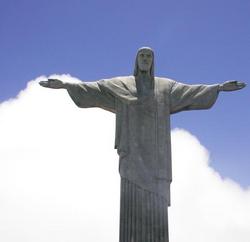
3. We believe in Christ, dead and risen, in Christ present here and now, who alone can change and changes man and the world, by transfiguring them.
Your presence, ever more numerous and significant in the life of the Church in Italy and in various nations in which your experience is beginning to spread, is due to this certainty which you must deepen and communicate, because it is this certainty that moves mankind. It is significant in this regard, and it should be noted, how the Spirit, in order to continue with the man of today that dialogue begun by God in Christ and continued in the course of all Christian history, has raised up many ecclesial movements in the contemporary Church. They are a sign of the freedom of forrns in which the one Church is expressed, and they represent a secure newness, which still awaits being adequately understood in all its positive efficacy for the Kingdom of God at work in the present moment of history.
My venerated predecessor, Pope Paul VI, addressing the members of the Florentine community of Communion and Liberation on December 28, 1977, stated: "We thank you also for the courageous, faithful, and firm witness that you have given in this somewhat disturbed period because of certain misunderstandings you have had to face. Be happy, be faithful, be strong and joyful and carry with you the witness that the Christian life is beautiful, strong, serene, and really capable of transforming the society in which it is lived."
4. Christ is the presence of God with man, Christ is the mercy of God towards sinners. The Church, the Mystical Body of Christ, and the new People of God, brings to the world this tender benevolence of the Lord, encountering and supporting man in every situation, in every environment, on every occasion.
In so doing, the Church contributes to generating that culture of truth and love which is able to reconcile the person with himself and with his own destiny. In such a way the Church becomes the sign of salvation for man, whose every desire for freedom she welcomes and values. The experience of this mercy renders us able to accept those who are different from us, to create new relationships, and to experience the Church in all the wealth and depth of its mystery as an unlimited desire for dialogue with man wherever he is found.
"Go into all the world" (Mt 28;19) is what Christ said to his disciples. And I repeat to you: "Go into all the world and bring the truth, the beauty, and the peace which are found in Christ the Redeemer". This invitation that Christ made to all his followers and which Peter has the duty ceaselessly to renew, is already interwoven with your history. In these thirty years you have been open to the most varied situations, casting the seed of the presence of your movement. I know that you have put down roots in eighteen nations in the world: in Europe, in Africa, in America, and I know also the insistency with which your presence is sought in other countries. Take on the burden of this ecclesial need: this is the charge I leave with you today.
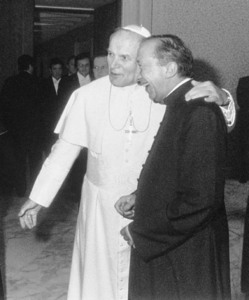
5. I know that you well understand the indispensable importance of a true and full communion between the various components of the ecclesial community. I am certain, therefore, that you will not fail to commit yourselves with renewed fervor in the search for more appropriate ways to carry out your activities in harmony and collaboration with the bishops, the pastors, and with all the other ecclesial movements.
Bring into the whole world the simple and transparent sign of the event of the Church. Authentic evangelization understands and responds to the needs of the individual man because it helps him to find Christ in the Christian community. The man of today has a particular need to have Christ in front of him, with clarity and evidence, as a profound sign of his birth, life, and death, and of his suffering and joy.
May Our Lady, Mother of God and of the Church, guide you constantly on the pathway of life. Knowing your devotion to the Holy Virgin, I hope that she will be for all of you the "Morning Star," who will enlighten and strengthen your generous commitment of Christian witness in the contemporary world.
And now I cordially give you my
Apostolic Blessing.
Pope John Paul II
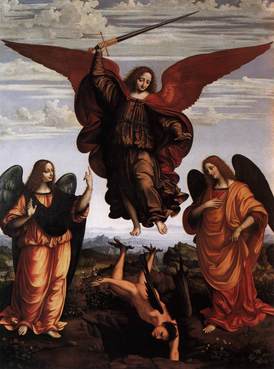 Bless the Lord, all you his angels, mighty in power, you obey his word and heed the sound of his voice.
Bless the Lord, all you his angels, mighty in power, you obey his word and heed the sound of his voice.Crossroads Cultural Center & Columbia Catholic Ministry in collaboration with the
Center for the Study of Science and Religion at Columbia
WONDER AND KNOWLEDGE
A conference on the origin of the
universe in science and philosophy and the role of wonder in scientific
discovery
SPEAKERS:
Msgr. Lorenzo ALBACETE--Theologian, author, columnist
Dr. Marco BERSANELLI-- Prof. of Astrophysics, University of Milan and author of From Galileo to Gell-Mann: The Wonder that Inspired the Greatest Scientists of All Time: In Their Own Words (Templeton Press)
Fr. Michael HELLER--Prof. of Philosophy, Pontifical Acad. of Theology, Krakow (2008 Templeton Prize winner)
Wednesday, September 30, 2009 at 8:00 PM
Columbia University Main Campus
Earl Hall Auditorium, 2980
Broadway at 116th Street, NYC
The conference is open to the public and free of charge.
For more information, visit www.crossroadsculturalcenter.org
Some have called Liliana Cavani's Francesco (1989; DVD 1998) a gritty alternative to Franco Zeffirelli's Brother Sun, Sister Moon. And I agree. Zeffirelli, while a brilliant filmmaker, can ruin a saint. And whatever may be said of Cavani's work, Francesco is neither a saccharine nor romantic portrayal of the 13th century's radical saint, Francis of Assisi. His sincerity is strikingly beautiful. This movie is based on Herman Hesse's book Francis of Assisi. Cavani's film won three awards and was nominated for a fourth. The legendary actor/boxer/dog lover and practicing Catholic, Mickey Rourke, played Saint Francis. And as a side bar, he credits his Catholic faith to saving his life.
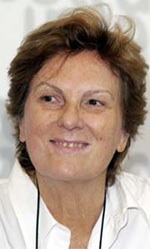
Liliana Cavani, born in 1933 in Capri, is the director of many television and cinematic productions. Her religious tendencies are basically unknown to me but I did hear that she leans or leaned toward a communist ideology. But I can't help wondering what really inspired Cavani to direct a film on such a figure as Francis of Assisi. Certainly it can't be the wacky-ness that often surrounds the figure of Francis!
Francesco is an interpretation of the person of the 13th century Umbrian saint, Francis of Assisi. He died in 1226 and founded what is today called the Franciscans 800 years ago. What the Franciscans looked like in the 13th century isn't what they are today. The movie is a series of flashbacks with various friends telling the story of the man who led them to Christ. Cavani brings out several central questions that all of us have to answer viz. our Christian faith: To whom do I belong? Do I belong to these people, or do I belong to Christ? How do I know and why?
The period in which the real Francis lived was a chaotic time in secular as well as ecclesial history. His world was faced with civil strife, wars, disease, extreme poverty in many sectors, illiteracy not to mention heretical movements tearing the fabric of faith to pieces. And, let's also not underestimate the wounds of the Church faced as a result of heresy: lack of true community, negligence of the human body, despair, lack of reasonable understanding of the faith and Truth and no reasonable response to the human reality. Hence, the notion of Francis rebuilding the Lord's Church took on significant importance for many people.
Why Francesco? It has little to do with the fact that his October 4th feast day is next Sunday. But it has everything to do with the fact that in our School of Community (Communion & Liberation's weekly catechetic meeting) we are reading Father Giussani' chapter on poverty in volume 2 of Is It Possible to Live This Way? There we are confronting the real, and truly theological reality, of possessing without possession. Giussani is raising the concern of restraining the possibility of grace in our lives but how we live our lives. So many of us can't face life in the manner in which it is given. We create escape mechanisms to mask the real life issues: pain, love, sorrow, faith, hurt, joy, lack of happiness, etc. Francis gave his whole life away to another person. He confused his parents and siblings; his friends and civil authorities were shocked. All could not understand Francis turning on end what was conventually known as "normal." He found something wonderful among the poor that became a contradistinction to the bourgeois normativity of Umbrian society. Renouncing self and possessions and following Christ crucified became his "normal." As Saint Clare says in the movie, God spoke to him again and His love made Francis' body identical to the Beloved's.
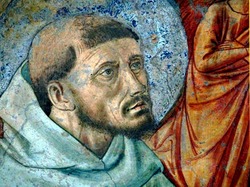
Cavani deals with poverty in a gritty manner--it is terrifically human. And she never moralizes poverty or religious conviction. Even when the pope asks Francis "and what are you criticizing me for" and Francis says "nothing" we can't believe our ears. Two men come back to Francis' family and friends looking to explain what they experienced and thinking that the men would point out the ugliness of poverty and extreme raw life of Francis, they said, "there's something beautiful there." You then realize that Francis isn't following "poverty"; he's following someone; he's closely adhering to beauty. But it is not ordinary beauty--it is the beauty of believing that he promises of Christ are true.
Why Francis? Because he points to Christ. His faith, courage and thinking he could live like Christ is what Giussani wants to suggest is the reason for our life. Giussani asks, quid animo satis? (what can satisfy the soul?) It has to be the Gospel at it's word or all is rubbish. Francis, by the way, is the only person the Church calls an alter Christus among the saints.
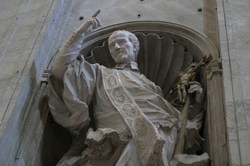
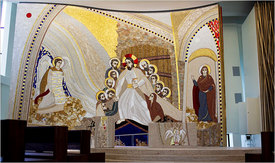 Sacred Heart University in Fairfield, CT enters into rites dedicating the Chapel of the Holy Spirit, today. Rarely do we have the opportunity to newly construct a marvelous work of art given for God's greater glory and His worship such as Sacred Heart's Chapel of the Holy Spirit. Having Father Rupnik's commission in Connecticut gives us a special link to the work of the Church in calling us to deeper union with God. Rupnik's mosaic work had its first world dramatic epiphany in Apostolic Palace's Mother of the Redeemer Chapel (Vatican City State) due to Pope John Paul being struck to the beauty wrought by Rupnik and his colleagues at the Centro Aletti. Today, we are struck by the same beauty drawn more deeply into the mystery, into radical holiness by another dramatic manifestation of the mosaics.
Sacred Heart University in Fairfield, CT enters into rites dedicating the Chapel of the Holy Spirit, today. Rarely do we have the opportunity to newly construct a marvelous work of art given for God's greater glory and His worship such as Sacred Heart's Chapel of the Holy Spirit. Having Father Rupnik's commission in Connecticut gives us a special link to the work of the Church in calling us to deeper union with God. Rupnik's mosaic work had its first world dramatic epiphany in Apostolic Palace's Mother of the Redeemer Chapel (Vatican City State) due to Pope John Paul being struck to the beauty wrought by Rupnik and his colleagues at the Centro Aletti. Today, we are struck by the same beauty drawn more deeply into the mystery, into radical holiness by another dramatic manifestation of the mosaics.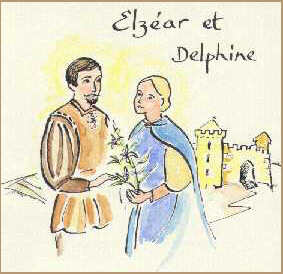
The cause for beatification and eventual sainthood of Father Michael J. McGivney, founder of the Knights of Columbus, took another step on September 22, 2009, with the submission of a supplemental report on a potential miracle attributed to the priest's intercession.
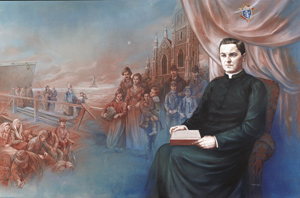
The Knights of Columbus announced today that officials from a supplemental tribunal of the Archdiocese of Hartford -of which Fr. McGivney was a parish priest- formally sent a new report to the Vatican's Congregation for the Causes of Saints through Dr. Andrea Ambrosi, the current postulator of McGivney's cause. The information gathered by the tribunal included testimonies from witnesses to the supposed miracle as well as the statements of several medical doctors about the circumstances surrounding the reported miracle. Dominican Father Gabriel B. O'Donnell, the current vice-postulator and former postulator, has worked on the cause for a number of years with the assistance of a variety people, not least was Millie Millea, the former secretary at the McGivney Guild.
In the context praying Sext (midday prayer), the brief ceremony in which the new report was signed and presented to Archbishop Henry J. Mansell was attended by Supreme Knight Carl Anderson, other Supreme Officers and other Knights of Columbus officials, three relatives of Father McGivney and a number of archdiocesan officials.
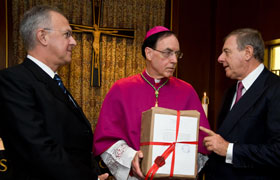
The submission of the new report "marks an important step forward. The Vatican's Congregation for the Causes of Saints will now have valuable additional testimony that clarifies and adds significantly to the original submission," Supreme Knight Carl Anderson said.
"Father McGivney's beatification would be an important event," Anderson added, "not only for Knights of Columbus, but for the many thousands of parish priests who quietly do the Lord's work in parishes each day and regard him as an outstanding example for priests everywhere. In this 'Year for Priests' it is an especially appropriate step forward." When beatified, McGivney will be the first US diocesan priest beatified.
The cause for Father McGivney's sainthood was opened by Hartford Archbishop Daniel A. Cronin in December 1997. In 2000, the cause was presented to the Congregation for the Causes of Saints; Pope Benedict XVI declared him "Venerable Servant of God" on March 15, 2008.
Father McGivney founded the Knights of Columbus in 1882 and died on August 14, 1890 at the age of 38. At the time of the founding of the Knights of Columbus he was a curate at Saint Mary's Church (New Haven, CT).
For pictures of the event see this link.
[this articled was first published at CNA and edited for
clarity]
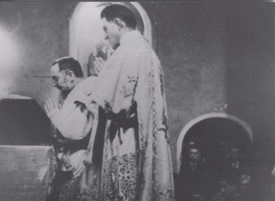
"...the legacy he left is holiness"
God our Father, in Saint Pio of Pietrelcina You gave a light to Your faithful people. You made him a pastor of the Church to feed Your sheep with his word and to teach them by his example. Help us by his prayers to keep the faith he taught and follow the way of life he showed us.
The Vatican biography may be read here.
See more on Saint Pio here.
When thinking about Padre Pio's influence on the spiritual life it can be noted that he advocated 3 things:
1. Pray. And don't be overcome.
2. Conform yourself to Christ crucified.
3. Attend to the sacraments, especially the sacrament of Confession.
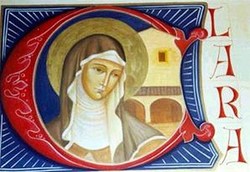 This day a brilliant star rises, for today Saint Clare, the poor handmaid of the Lord, is glorified in heaven.
This day a brilliant star rises, for today Saint Clare, the poor handmaid of the Lord, is glorified in heaven.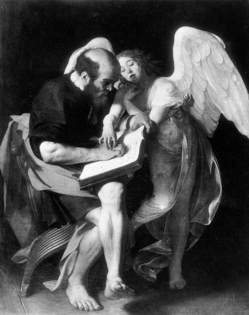 We beseech Thee, O Lord, let the prayers of blessed Matthew, Thine Apostle and Evangelist, assist us, that those things which we cannot obtain by ourselves may be granted us by his intercession.
We beseech Thee, O Lord, let the prayers of blessed Matthew, Thine Apostle and Evangelist, assist us, that those things which we cannot obtain by ourselves may be granted us by his intercession.
Many think that Saint John Vianney is the only canonized parish priest. Vianney is certainly the most known for his extraordinary life. And it helps that popes and other notable authors have drawn our attention to him. But there is another saint who has a persuasive personality who is also a parish priest and worthy of our attention. In this Year of the Priest it fitting to have yet another intercessor before God. Today the Church celebrates the liturgical memorial of Saint Gaetano Catanoso.
Pope Benedict XVI canonized him on October 23, 2005. In the homily of the Mass of Canonization said:
Saint Gaetano Catanoso was a lover and apostle of the Holy Face of Jesus. "The Holy Face," he affirmed, "is my life. He is my strength". With joyful intuition he joined this devotion to Eucharistic piety.
He would say: "If we wish to adore the real Face of Jesus..., we can find it in the divine Eucharist, where with the Body and Blood of Jesus Christ, the Face of Our Lord is hidden under the white veil of the Host."
Daily Mass and frequent adoration of the Sacrament of the Altar were the soul of his priesthood: with ardent and untiring pastoral charity he dedicated himself to preaching, catechesis, the ministry of confession, and to the poor, the sick and the care of priestly vocations. To the Congregation of the Daughters of Saint Veronica, Missionaries of the Holy Face, which he founded, he transmitted the spirit of charity, humility and sacrifice which enlivened his entire life.
More of Saint Gaetano can be read here.
The American cousin of the saint has a book on Saint Gaetano Catanoso, see it at this link.
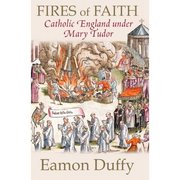 Stuart Chessman, the blogger at The Society of St. Hugh of Cluny recently gave his musings of Eamon Duffy's newest work, Fires of faith: Catholic England under Mary Tudor (New Haven: Yale University Press, 2009).
Stuart Chessman, the blogger at The Society of St. Hugh of Cluny recently gave his musings of Eamon Duffy's newest work, Fires of faith: Catholic England under Mary Tudor (New Haven: Yale University Press, 2009).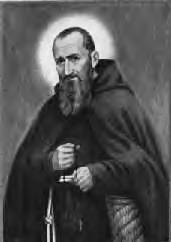 Lavishly he gave to the poor; his generosity shall endure forever.
Lavishly he gave to the poor; his generosity shall endure forever.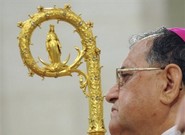 A recently published story about the comments on the future of the Holy Land made by His Beatitude Fouad Twal, Patriarch of Jerusalem, are nothing new: the Holy Land is facing a significant reduction in the numbers of Christians living there and help from the world's Christians is desperately needed. No one following the Church can say this is news since for years it's been said that the various Christian communities are leaving in vast numbers each year due to oppression and other hardships. What may be new, perhaps, is that the Patriarch is now admitting that the methodology to secure a better life and peace in that region was wrong. Arab-Israeli problems are only the tip of the iceberg. Divisions in the Christian community have made matters worse, even hopeless for many. Even the Pope's visit made little difference. Everything from the economy to education, to security, to personal freedoms, to religious sectarianism among the Christians has not produced one iota of hope for the future. What does a Christian presence in the Holy Land mean today? What difference does it make? What to do? First, one ought to pray. Second, one ought to find ways to understand the issues at hand; the witness of practicing Christians at the Holy Places in Jerusalem is crucial for the memory and active memory of the Gospel of Jesus Christ; but knowing the facts can be hard to do since the media is controlled by the Israelis who ideologically spin the stories. Third, do something. Christians around the world need to do something to be in solidarity with Christians there. Fourth, respond with reason and humanity. Can one image in the Holy Land without Christians? I can. AND that's a problem. Charity needs to have a presence. Charity needs a face and a voice. What about yours?
A recently published story about the comments on the future of the Holy Land made by His Beatitude Fouad Twal, Patriarch of Jerusalem, are nothing new: the Holy Land is facing a significant reduction in the numbers of Christians living there and help from the world's Christians is desperately needed. No one following the Church can say this is news since for years it's been said that the various Christian communities are leaving in vast numbers each year due to oppression and other hardships. What may be new, perhaps, is that the Patriarch is now admitting that the methodology to secure a better life and peace in that region was wrong. Arab-Israeli problems are only the tip of the iceberg. Divisions in the Christian community have made matters worse, even hopeless for many. Even the Pope's visit made little difference. Everything from the economy to education, to security, to personal freedoms, to religious sectarianism among the Christians has not produced one iota of hope for the future. What does a Christian presence in the Holy Land mean today? What difference does it make? What to do? First, one ought to pray. Second, one ought to find ways to understand the issues at hand; the witness of practicing Christians at the Holy Places in Jerusalem is crucial for the memory and active memory of the Gospel of Jesus Christ; but knowing the facts can be hard to do since the media is controlled by the Israelis who ideologically spin the stories. Third, do something. Christians around the world need to do something to be in solidarity with Christians there. Fourth, respond with reason and humanity. Can one image in the Holy Land without Christians? I can. AND that's a problem. Charity needs to have a presence. Charity needs a face and a voice. What about yours?
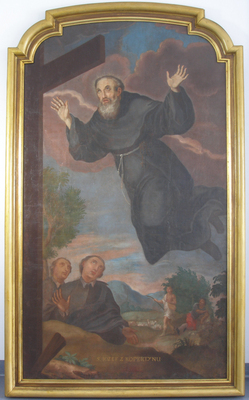
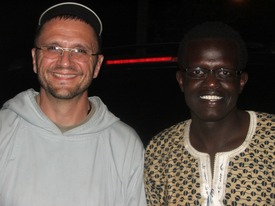
Appeals for money on this blog are rare but I believe in giving to needy philanthropic projects. Plus, this request comes via my friend Henry who is connected with the priest in question (and seen to the right).
On my own recommendation I urge you to give because I believe the work and witness of the Franciscans. AND that I am in school with many Franciscan Friars of the Renewal, I am asking for consideration of Father Herald Brock's mission work. Father Herald is a Franciscan Friar of the Renewal. Therefore, I want to encourage you to consider making a donation. Details about the situation are on Father Herald's blog.
Donations in the form of checks or money orders made out to "CFR Sudan Mission," can be sent to the following address:
CFR Sudan Mission
PO Box 1086
Secaucus, NJ 07096-1086
Please note in the memo box if you would like the funds to be used for hunger relief.
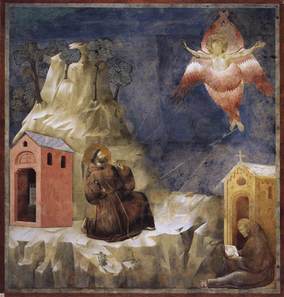
Lost but not forgotten in Catholic practice are the observances for Autumn Ember Days, the "Four Seasons." Other ember days are prayed in December (3rd week of Advent), Lent (after the 1st Sunday of Lent) and after Pentecost but in its octave. The autumn ember days are observed on the Wednesday, Friday and Saturday following the Triumph of the Holy Cross, September 14. This year the ember days are September 16, 18, & 19. Tradition has also called this period of prayer, procession, fasting and partial abstinence the Michaelmas Ember Days given the proximity to the liturgical memorial of Saint Michael the Archangel on September 29th.
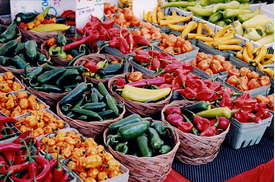
The occasion for Ember Days are the seasons of the year. As you would think, each season we give ought to give thanks to God for graces received and the fruits of the harvest. Ember days are rich in theology and culture going back a very long time in the Catholic Church, one can argue to the very early Church where the first fruits were given to the Lord. One might also recall the Jewish customs of prayer and fasting and purification in the autumn. Those with a strong liturgical bent will recall that before the "reform" of the missal following the Second Vatican Council the Church had a richer and deeper understanding of the nature of ember days: each day had their own Mass, Scripture readings from both Testaments, processions and prayers. Today, ember days are all but forgotten save for a small number of people who bother to read ritual books and liturgical theology and who think these things have import for the contemporary life of the Church.
As we delve more deeply into our Catholic faith and the various liturgical observances of thanksgiving, conversion and supplication, we might consider spending time during these ember days in gratitude to God for what He's given for our earthly sustenance asking Him for the grace of conversion. Additionally, I am reminded with these ember gestures of the recent emphasis on the environment and ecology viz. the faith that Pope Benedict said last week: "Today more than ever people must be helped to see in creation something more than a simple source of wealth or exploitation in man's hands. The truth is that when God, through creation, gave man the keys to the earth, he wanted him to use this great gift responsibly and respectfully, making it fruitful. The human being discovers the intrinsic value of nature if he learns to see it for what it really is, the expression of a plan of love and truth that speaks to us of the Creator and of his love for humanity, which will find its fulfillment in Christ, at the end of time. In this context it is important to reiterate the close relationship between protection of the environment and respect for the ethical requirements of human nature, because when human ecology is respected within society, environmental ecology also benefits."
Living
the ember days more fully would allow for a renewed interest in praising God
for creation, the concern of humanity's proper use of creation and our keen stewardship of nature for future generations.
Cf. "Order of Blessing on the Occasion of Thanksgiving for the Harvest" (Book of Blessings, nos 1007-1023) or in the 3rd volume of Fr Weller's Roman Ritual. Two prayers from the Maronite book of blessings read:
May God bless + this fruit, those who bring it, present it, and share in it. May the mercy of the Holy Trinity, Father, Son, and Holy Spirit, come down upon those who labored to produce this fruit and those who were in any way associated with them. Praised be to God, now and for ever. Amen.
And
O Lord, your right hand blessed the few loaves of bread in the desert, and through the hands of the prophet Elijah you blessed the jar of wheat and the jug of oil in the house of the widow. May your blessing now come down, through my right hand bless + this house (granary or this wheat or grain) and all the food that it kept here. As you blessed the homes and the reserves of the just of old --Abraham, Isaac, Jacob, Joseph, Job, and David--shower your abundant blessings upon the yield of your worshipers. We praise you, now and for ever. Amen.
O Lord, save your people and bless + your inheritance. Feed them, and carry them for ever.

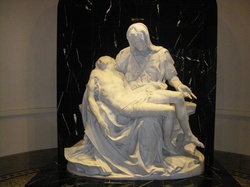
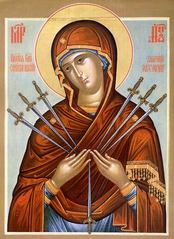
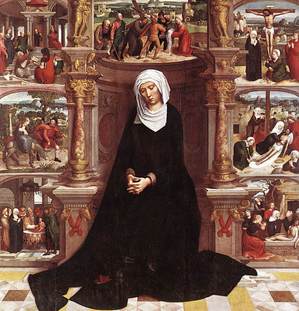
Stabat Mater dolorosa iuxta crucem lacrimosa, dum pendebat Filius. | The grieving Mother stood beside the cross weeping where her Son was hanging. |
Cuius animam gementem contristatam et dolentem pertransivit gladius. | Through her weeping soul, compassionate and grieving, a sword passed. |
O quam tristis et afflicta fuit illa benedicta mater Unigeniti! | O how sad and afflicted was that blessed Mother of the Only-begotten! |
Quae maerebat et dolebat pia mater cum videbat nati poenas incliti. | Who mourned and grieved, the pious Mother, with seeing the torment of her glorious Son. |
Quis est homo qui non fleret, matrem Christi si videret in tanto supplicio? | Who is the man who would not weep if seeing the Mother of Christ in such agony? |
Quis non posset contristari, piam matrem contemplari dolentum cum Filio? | Who would not be have compassion on beholding the devout mother suffering with her Son? |
Pro peccatis suae gentis vidit Iesum in tormentis et flagellis subditum. | For the sins of His people she saw Jesus in torment and subjected to the scourge. |
Vidit suum dulcem Natum morientem, desolatum, cum emisit spiritum. | She saw her sweet Son dying, forsaken, while He gave up His spirit. |
Christe, cum sit hinc exire, da per matrem me venire ad palmam victoriae. Amen. | Christ, when it is henceforth in need to pass away, grant that through your Mother I may come to the palm of victory. Amen. |
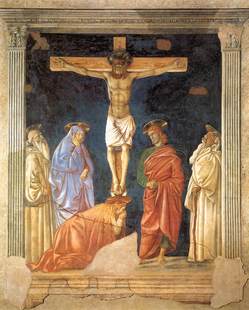 Thinking about the life-saving cross of Jesus, I am
recalling what Saint Ignatius of Loyola taught in his Spiritual Exercises about
God's unconditional love for humanity: no talk of the mercy and love is
reasonable without kneeling before the cross. This was evident to me as I
walked into the chapel this morning for Lauds and forced to navigate in the
middle of the aisle a cross with relic of the True Cross before it. I knelt for
a moment of prayer and kissed the relic. It is striking to do this pious gesture
because it brings home to the heart, the Christian reality that the cross is so central to our
life of faith; it is the altar on which we are saved; the cross is key which
unlocks the door to the Father's house; it is the love that kills and transcends all sin.
Thinking about the life-saving cross of Jesus, I am
recalling what Saint Ignatius of Loyola taught in his Spiritual Exercises about
God's unconditional love for humanity: no talk of the mercy and love is
reasonable without kneeling before the cross. This was evident to me as I
walked into the chapel this morning for Lauds and forced to navigate in the
middle of the aisle a cross with relic of the True Cross before it. I knelt for
a moment of prayer and kissed the relic. It is striking to do this pious gesture
because it brings home to the heart, the Christian reality that the cross is so central to our
life of faith; it is the altar on which we are saved; the cross is key which
unlocks the door to the Father's house; it is the love that kills and transcends all sin.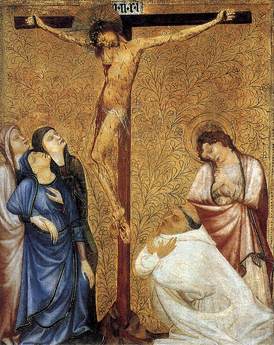 In one respect the cross does have a terrible aspect
that we ought not to remove. To see that the purest of men, who was more than a
man, was executed in such a grisly way can make us frightened of ourselves. But
we also need to be frightened of ourselves and out of our self-complacency.
In one respect the cross does have a terrible aspect
that we ought not to remove. To see that the purest of men, who was more than a
man, was executed in such a grisly way can make us frightened of ourselves. But
we also need to be frightened of ourselves and out of our self-complacency.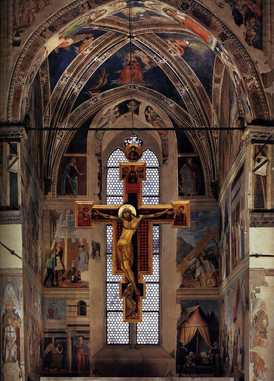
God the Father has exalted
Jesus Christ, the Lord of all,
Who has emptied self of glory,
Took our human nature's thrall;
In obedience, He was humbled
Taking even cross and death;
Now creation shouts in wonder
"Christ is Lord" with ev'ry breath!
As the Cross is boldly
lifted
And the faithful now embrace
What was once a thing so shameful,
Now the hope of all our race,
Let us, marked with Cross, and
baptized,
Shout this news throughout the earth:
Through the Cross, our God has conquered!
Through it, come to His new birth!
87.87. D, no tune suggested
James Michael Thompson, (c) 2009, World Library Publications
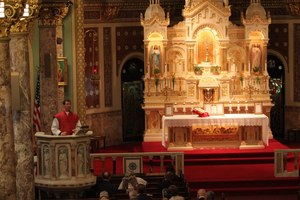 This afternoon the first Mass celebrated by priests associated with the Saint Gregory Society was offered at Saint Stanislaus Church, New Haven, CT. Having attended Mass at the Church since the mid-1970s I am elated that this has transpired, as I mentioned earlier on this blog. The beauty of the architecture coupled with the beauty of the sacred Liturgy is a wonderful convergence.
This afternoon the first Mass celebrated by priests associated with the Saint Gregory Society was offered at Saint Stanislaus Church, New Haven, CT. Having attended Mass at the Church since the mid-1970s I am elated that this has transpired, as I mentioned earlier on this blog. The beauty of the architecture coupled with the beauty of the sacred Liturgy is a wonderful convergence.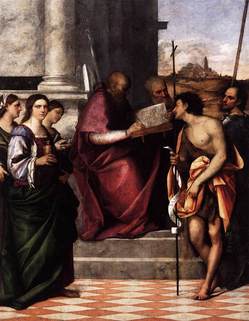 O blest teacher, light of holy Church, blessed John Chrysostom, thou lover of God's law, plead with the Son of God for us.
O blest teacher, light of holy Church, blessed John Chrysostom, thou lover of God's law, plead with the Son of God for us.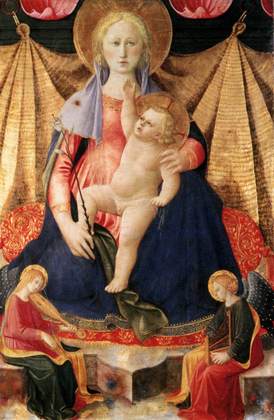 You have been blessed, O Virgin Mary, above all other women on earth by the Lord, the Most High God, for God has so exalted your name that human lips will never cease to praise you.
You have been blessed, O Virgin Mary, above all other women on earth by the Lord, the Most High God, for God has so exalted your name that human lips will never cease to praise you.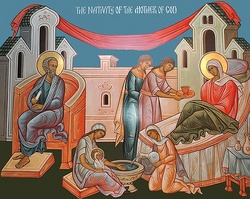
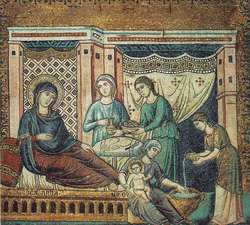 It is the nativity of the glorious Virgin Mary, sprung from the seed of Abraham, of the tribe of Juda, of the renowned family of David.
It is the nativity of the glorious Virgin Mary, sprung from the seed of Abraham, of the tribe of Juda, of the renowned family of David.
If we have no peace, it is because we have forgotten that we belong to each other. (Blessed Teresa of Calcutta)
26 August 1910 to 5 September 1997
"This celebration of Mother Teresa should remind us that the work of mercy, charity and compassion still have a fundamental place in our being disciples of Jesus today. During her life Mother put into practice in many ways Charity in Truth (Fr Cedric Prakash, SJ, Sept. 5, 2009).
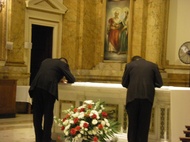 Tonight 7 men made the Profession of Faith and the
Oath of Fidelity (which I encourage you too read) at Vespers. These 7 men will be ordained to the Order of
Deacon tomorrow here in the Saint Joseph Seminary Chapel by Bishop Dennis
Joseph Sullivan, VG, auxiliary bishop of New York: James H. Ferreira, George
LaGrutta, Steven R. Markantonis, Fredy P. Montoya, Thomas Roslak, Enrique J. Salvo,
Daniel P. Tuite.
Tonight 7 men made the Profession of Faith and the
Oath of Fidelity (which I encourage you too read) at Vespers. These 7 men will be ordained to the Order of
Deacon tomorrow here in the Saint Joseph Seminary Chapel by Bishop Dennis
Joseph Sullivan, VG, auxiliary bishop of New York: James H. Ferreira, George
LaGrutta, Steven R. Markantonis, Fredy P. Montoya, Thomas Roslak, Enrique J. Salvo,
Daniel P. Tuite.The following is the text Benedict XVI sent to Cardinal Walter Kasper, president of the Pontifical Council for Promoting Christian Unity, on the occasion of the 11th Inter-Christian Symposium, which began today in Rome.
Through you, venerable brother, in your capacity as president of the Pontifical Council for Promoting Christian Unity, I have the pleasure and joy of sending a warm and auspicious greeting to the organizers and participants of the 11th Inter-Christian Symposium, promoted by the Franciscan Institute of Spirituality of the Pontifical University Antonianum and by the Aristotle Orthodox Theological Faculty of Thessalonica, planned in Rome from Sept. 3-5.
I am happy first of all for this initiative of fraternal encounter and exchange on the common aspects of spirituality, which is beneficial for a closer relationship between Catholics and Orthodox. In fact, these Symposiums, which began in 1992, address important and constructive topics for reciprocal understanding and unity of intention. The fact that it takes place alternatively in a territory of Catholic or Orthodox majority also allows for real contact with the concrete, historical, cultural and religious life of our Churches.
In particular, this year you wished to organize the Symposium in Rome, city that offers all Christians indelible testimonies of history, archaeology, iconography, hagiography and spirituality, strong stimulus to advance toward full communion and above all, the memory of the Apostles Peter and Paul, Protothroni, and of so many martyrs, ancient witnesses of the faith. Of them, St. Clement of Rome wrote that "suffering ... many insults and torments, they became a most beautiful example for us" (Cf. Letter to the Corinthians, VI,1).
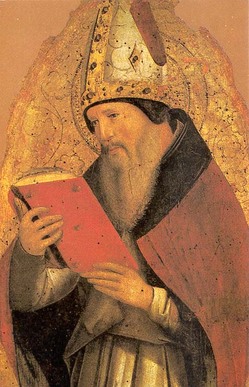
The topic chosen for the next meeting: "St. Augustine in the Western and Eastern Tradition" -- argument intended to be developed in collaboration with the Patristic Institute Augustinanum -- is most interesting to reflect further on Christian theology and spirituality in the West and in the East, and its development. The Saint of Hippo, a great Father of the Latin Church, is, in fact, of fundamental importance for theology and for the West's very culture, whereas the reception of his thought in Orthodox theology has revealed itself to be rather problematic.
Hence, to know with historical objectivity and fraternal cordiality the doctrinal and spiritual riches that make up the patrimony of the Christian East and West, is indispensable not only to appreciate them, but also to promote better reciprocal appreciation among all Christians.
Therefore, I express cordial wishes that your Symposium is fruitful in that it discovers doctrinal and spiritual convergences that are useful to build together the City of God, where his children can live in peace and in fraternal charity, based on the truth of the common faith. I assure you of my prayer for this end, asking the Lord to bless the organizers and the institutions they represent, the Catholic and Orthodox speakers and all the participants. May the Grace and peace of the Lord be in your collaborators and in your minds!
In Castel Gandolfo,
August 28, 2009
Benedictus PP. XVI
Blessed Mary Stella and her companions were authentic martyrs for the faith: they "...paid with their blood for the charity they exercised in favor of escapees, of the wounded and the sick during the terrible and uncertain days" (His Will Alone, 424).
They had engaged life as any other person does and so I thinking giving the names of the sisters keeps memory of the women, our friends, alive in our hearts. Certainly as a kid in a Nazareth school (New Haven, CT) this image of the sisters was haunting and striking. On my desk sits the commemorative coin, a gift of Sister Thaddeus of Jesus, CSFN, with the faces and names of the sisters reminding me of the gift their lives are for us.
The eleven Sisters of the Holy Family of Nazareth who were executed by the Nazis on August 1, 1943 were:
Sister Maria Stella, Superior
(Adelaide Mardosiewicz) (1888-1943)
Sister Mary Imelda (Jadwiga Zak) (1892-1943)
Sister Mary Rajmunda (Anna Kukulowicz) (1892-1943)
Sister Maria Daniela (Eleanor Juzwik) (1895-1943)
Sister Maria Kanuta (Jozefa Chrobot) (1896-1943)
Sister Maria Gwidona (Helena Cierpka) (1900-1943)
Sister Maria Sergia (Julia Rapieg) (1900-1943)
Sister Maria Kanizja (Eugenia Mackiewicz) (1904-1943)
Sister Maria Felicyta (Paulina Borowik) (1905-1943)
Sister Maria Heliodora (Leokadia Matustzewska) (1906-1943)
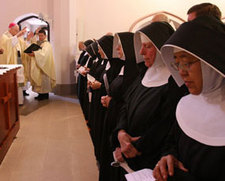 You may have seen the story of 10 nuns come into full communion with the Catholic Church. The ceremonial aspect of full communion was yesterday but the journey to that point was long in coming individually and corporately. Archbishop Edwin O'Brien of Baltimore received the nuns and is working with them to become a diocesan right community.
You may have seen the story of 10 nuns come into full communion with the Catholic Church. The ceremonial aspect of full communion was yesterday but the journey to that point was long in coming individually and corporately. Archbishop Edwin O'Brien of Baltimore received the nuns and is working with them to become a diocesan right community.
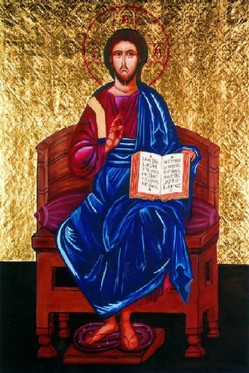
Our methods of entering the divine mysteries are varied: some
use the spoken or written word (poet, some use photography, some will engage nature,
some may use music & dance and still others will use the time-honored
tradition of icons. Jesuit Father Stephen Bonian takes us through a variety of
fitting understandings of iconography and their use for prayer in his article,
"Gateways to Prayer."
For we see ...
"In God's beauty, all the earth is sanctified.
Tree and stone, wood and paint have glory
In His beauty.
Creation is transformed;
The fallen is made holy.
And man, beholding Beauty's vision,
Shares His life."
("On the Beauty of God" by an anonymous Orthodox author)
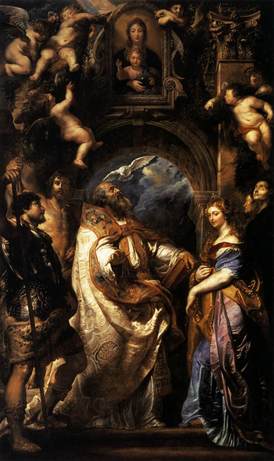
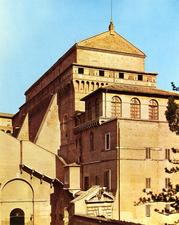 Under the leadership of Archbishop Gianfranco Ravasi, President of the Pontifical Council for Culture, contemporary artists of all media are invited to the Vatican for a meeting on November 21st.
Under the leadership of Archbishop Gianfranco Ravasi, President of the Pontifical Council for Culture, contemporary artists of all media are invited to the Vatican for a meeting on November 21st. 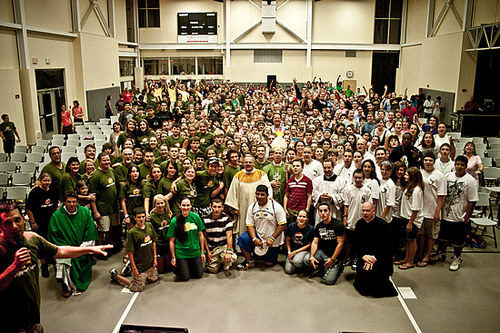
The Rimini Meeting, mentioned here before, invited Carl Anderson, the Supreme Knight of the Knights of Columbus to address the more than 700,000 attendees on August 28, 2009. In his address he spoke about the common, practical spirituality of the Knights as influencing works of Charity. Knowing that "Christ plays in ten thousand places, Lovely in limbs, and lovely in eyes not his", Anderson advocated a life of charity that spurs all people --at least it ought to-- to build a civilization of love based on real, lasting hope.
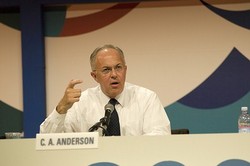
The point for Catholics is not to set up another group of "do-gooder" structure no matter of the brilliance of the idea which has no grounding in the dignity of man and woman and/or with some vague understanding of Christianity, but to form a companionship, friends who are rooted in Christ Jesus. Only then can we truly, actually care for another. Many can argue rightly that people who have no faith or don't share faith in Christ can build a loving and caring society. True and there are bountiful examples of this being done all around the world. But for those who claim to be Christians, substance over sentiment is what drives. I don't do something and meet Christ. Rather, I have met Christ and therefore I live differently with myself and with my brothers and sisters around me. Otherwise we have beige Catholicism and we don't need more of that stuff.
In my opinion, Carl Anderson touches on this point: our Christian lives are not sustained by a something but a someone: Christ who sacrificed himself for us on the cross and then rose from the dead. This is the hope Christians have. If we forget this point then we Catholics are no different than the Elks lodge and that may be OK for some but I think being Catholic means something more: that we come to know our God is a personal way through helping others. Ask yourself: How am I different after I've done something for my neighbor? Has my life in Christ changed, or not? Mr. Anderson draws on sacred Scripture & Theology as well as the works of Popes John Paul II and Benedict XVI. Particularly re-read Deus caritas est.
Carl Anderson's talk can be read here
Speaking to the Serra Club dinner, renown for fostering vocations to the priesthood, diocesan and religious orders, Archbishop Timothy Dolan outlined 4 priorities:
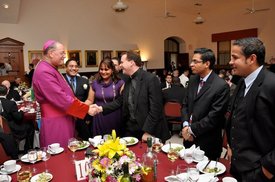
1. Emphasize the vocation of marriage and family:"Taking care of the first crisis will take care of the second," said Archbishop Dolan. "Vocations to the priesthood and religious life come from lifelong, life-giving faithful marriages."
2. Re-create a culture of vocations: "There were no good old days in the Church. Every era in Church history has its horrors and difficulties. We need to recapture the climate/tenor/tone/ambiance in the Church where a boy or man isn't afraid to publicly say, 'I want to be a priest,' and where his family, relatives, neighbors, parish, priest, sisters, teachers and even non-Catholics are robustly supportive."
3. The laity need to not be afraid to ask their priests to help them be holy: "For a faithful Catholic, a priest is essential for growth in holiness because he gives us the sacraments, and without the sacraments we can't be holy. When you ask us to help you be holy, we realize that we must be holy, and you remind us that there is something unique in the Church that only a priest can do."
4. Priests must be reminded that they are here to help the laity
get to heaven: "A priest is an icon of the beyond, the eternal, the transcendent.
Heaven gives us hope and meaning in life."
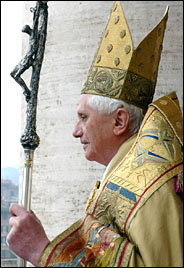 The general intention
The general intention